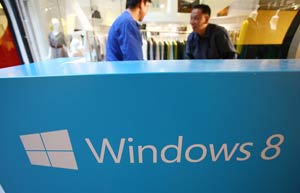Experts predict local OS will be ready by October
By GAO YUAN (China Daily) Updated: 2014-08-26 09:05Chinese antitrust inspectors are probing the Windows series for signs of a monopoly. Microsoft's flagship OS—Windows 8—was banned in central government offices because of security concerns.
Analysts said Chinese OS developers will likely get more business than ever because of the incidents. However, the shoes of overseas companies will be hard to fill.
"Microsoft's leading position in the market is almost unshakable. The company has formed a well-established ecosystem," said Wang Jingwen, a Shanghai-based analyst with industry consultancy Canalys.
Local providers have to compete with multinationals such as Microsoft and Oracle Corp for a share of the personal-and enterprise-use OS market.
Ni, a longtime supporter of software localization, said the real shot for Chinese firms lies in enterprise-use and government procurement sectors.
The Ministry of Industry and Information Technology has vowed to boost made-in-China software in a bid to avoid security threats and help local firms expand.
Revenue in the software sector exceeded 3 trillion yuan ($480 billion) in 2013, a 23.4 percent surge year-on-year, according to statistics from the ministry.
Small Chinese vendors may get enough orders from government-related projects to survive if they can partner with stronger ones such as Alibaba Group Holding Ltd, said Dai from Forrester.
"I don't think the market is big enough for every local OS maker to flourish," he added.
 |
 |
|
|
- High loan rates standing in the way of progress
- GM to recall Saab 9-3 defective cars in China
- InterContinental opens 5-star hotel in Lhasa
- Slower rise in China's crude steel output
- Moutai moving into online markets
- Profits rise for retailer Gome
- China allows more private firms into telecoms
- Experts predict local OS will be ready by October
















